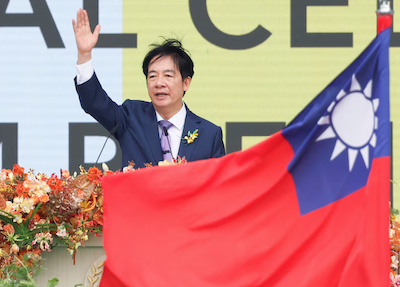Senior Taiwanese officials have flown to Washington DC to set up ties with the incoming Trump Administration.
Two officials from the island’s National Security Council have had meetings this week to connect with President-elect’s transition team, according to multiple sources.
Reuters identified the officials as Lin Fei-fan and Hsu Szu-chien, both deputy secretaries-general of Taiwan’s National Security Council. It said they and several of their staff had travelled to the US capital, but the sources refused to be named and or publicly reveal the purpose of their visit.
ALSO SEE: China Central Bank ‘to Allow a Weaker Yuan’ as Trade Risk Rises
Taiwan’s presidential office said the national security team’s visit and “exchanges” were a routine part of their work, and that it had no further comment.
The Trump transition team did not respond to requests for comment.
Reuters was not able to confirm who from the US side would join the meetings or the agenda.
China setting a ‘red line’ for Trump
The visit by Lin and Hsu comes as China’s military has stepped up activity near the Taiwan Strait, in what Taiwan has said is Beijing’s effort to set a “red line” for the incoming Trump administration and US allies.
One of the sources said the meetings were with individuals in Trump transition circles but would not include nominees for top positions in Trump’s next administration, given sensitivity in Beijing over any talks between Taiwanese and US officials.
The meetings are with “Republicans likely to populate mid-tier political positions” in the Trump administration, a second source said. A third source said it was “safe to say” Lin and Hsu were meeting the Trump transition team.
A fourth source added that visits to the United States at such a level are not rare and that they are to meet “old friends”, including people in Trump’s circle.
Asked about the visits, China’s foreign ministry said it urged the United States to “cautiously handle the Taiwan issue, and not send any wrong signals to Taiwan independence separatist forces”.
The United States does not have formal diplomatic relations with Taiwan, a democratically governed island that China claims as its own territory. Taiwan rejects Beijing’s sovereignty claims, saying only the island’s people can decide their future.
Large arms deals?
Trump’s electoral win in November has sparked hope in Taipei that he will pursue a tough line with China but also anxiety given his comments that the island should pay the US for its defence.
Trump has named numerous China hawks to key posts in his incoming administration, including Senator Marco Rubio as secretary of state, who has called for unfettered interaction between US and Taiwan officials.
Those nominations have been encouraging for Taipei, which Reuters has reported may place large new arms deals to show it takes seriously Trump’s statements that Taiwan should pay “protection” money to the United States.
Engagement to date between Taiwan and the incoming administration appears to fall in a grey area of unofficial contact and has been low-key.
CBS Says Trump invited Xi to his inauguration
That’s a departure from the period before Trump’s first term, when in December 2016, the month before his inauguration, he held a phone call with then-Taiwan president Tsai Ing-wen.
That call marked the first time since 1979 that a US president-elect had spoken with the island’s president, a move that angered China.
Ahead of his second inauguration, scheduled for January 20, CBS News reported on Wednesday that Trump had invited Xi to attend the event, something that would be unprecedented for a Chinese leader.
The president-elect’s camp did not immediately respond to a request for comment on the report, but Trump said in a interview with NBC News conducted last Friday that he “got along with very well” with Xi and that they had “had communication as recently as this week.”
The South China Morning Post said on Thursday that President Xi is “unlikely to accept Donald Trump’s invitation to attend his inauguration, due to diplomatic protocols and historical practices, as no Chinese head of state has attended a US presidential transition ceremony.”
It said the process for a Chinese president to visit the US usually requires months of preparation.
- Reuters with additional editing by Jim Pollard
NOTE: Further details were added to this report on December 12, 2024.
ALSO SEE:
China Deploys Biggest Naval Fleet in 30 Years, Taiwan Warns
China ‘More Vulnerable to Trump Tariffs’ After Slowdown
Taiwan Hopes US’ Need For Chips Will Save it From Trump Tariffs
Taiwan Says TSMC Not Allowed to Make 2nm Chips Abroad, For Now
TSMC to Cut Off All Chinese AI Clients From Its Advanced Chips
Trump Will Have Big Impacts on Trade, Climate Change, EVs
Trump Says He’ll Hit China With Big Tariffs if it Takes Taiwan
China War Risk Sees Taiwan’s TSMC Moving Fabs to US, Japan
China Unveils Video of Simulated Invasion of Taiwan
























